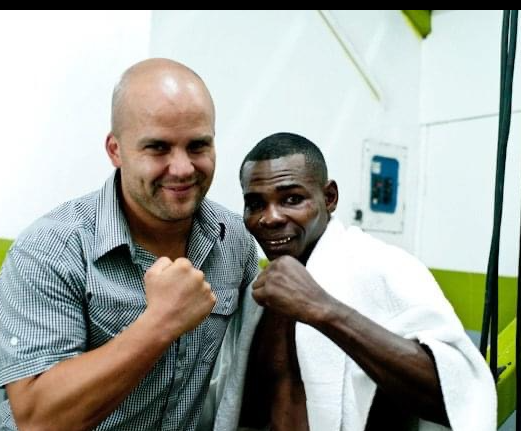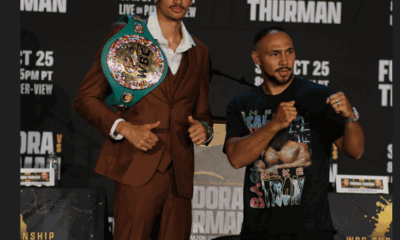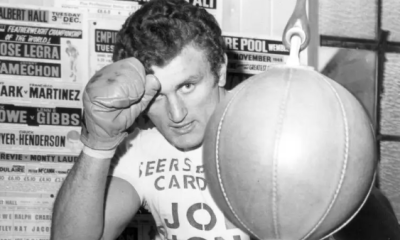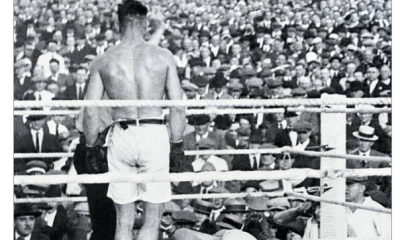Featured Articles
Brin-Jonathan Butler Reflects on Cuban Boxers, Mike Tyson, Roy Jones Jr and More

Brin-Jonathan Butler Reflects on Cuban Boxers, Mike Tyson, Roy Jones Jr and More
In the truest sense of the word multimedia, Brin-Jonathan Butler more than holds his own.
An author, freelance journalist, documentary filmmaker, Amazon interviewer, and host of the podcast “Tourist Information,” Butler’s works have appeared in Harper’s, ESPN The Magazine, The Paris Review, The Daily Beast, SB Nation, Salon.com and the Huffington Post, among others. He also has a keen interest in boxing manifested in two acclaimed books that he wrote: “A Cuban Boxer’s Journey: Guillermo Rigondeaux, From Castro’s Traitor To American Champion” and “The Domino Diaries: My Decade Boxing With Olympic Champions And Chasing Hemingway’s Ghost In The Last Days Of Castro’s Cuba.”
A native of Vancouver, British Columbia, Butler’s fascination with the island nation began when he was quite young. “Very early on in my life, my father told me stories about how the closest the world had ever come to nuclear oblivion was during the Cuban Missile Crisis in October of 1962. He told me terrifying stories about being a child in school learning procedures, along with his classmates, of how to hide under his school desk if the United States and Soviet Union escalated their standoff.”
“Growing up, the way Cuba was presented to me in Canada through American media with such intensity, made Cuba seem both radioactive and utterly fascinating. The iconography of Cuba and Fidel Castro was mesmerizing, deeply troubling, and also very confusing.”
Butler draws a parallel with the movie Rocky IV which came out when he was six years old.
“Sylvester Stallone’s Ivan Drago is basically a Frankenstein-like monster created by a robotic, diabolical system. Drago shows no sign of humanity after killing Apollo Creed. He takes steroids. He’s miserable. Drago’s country appears to live in a suffocating, year-round, utterly depressing winter. Rocky Balboa and everything he represents to [Ronald] Reagan’s America is the exact opposite.”
Butler, who is now a New York City resident, went on: “So I suppose Rocky IV pro wrestling-style, jingoistic propaganda just made meeting Cuban athletes that much more shocking for me. Not only was I unprepared, but I was also very much programmed to see them a certain way that did not line up in almost any way with what I encountered.”
“In 1992, Cuba basically rolled over the world in boxing. How could this happen? And then they were even more dominant around the globe with baseball!…I didn’t understand why I only saw Cuban athletes during amateur athletic competitions when they clearly had the ability to not just compete at the professional level but dominate. Then I learned about many of the greatest Cuban athletes refusing to leave Cuba and turn professional citing that they competed for something more important than money.”
Butler never had a doubt about making his way to Cuba and interviewing some of its greatest athletes. “I dreamed very early on of having the opportunity to meet the most famous boxers who rejected millions to leave Cuba, especially Teofilo Stevenson and Felix Savon turning down the opportunities to face Muhammad Ali and Mike Tyson for profound sums of money,” he said. “It still seems beyond surreal that I had an opportunity to walk into the houses of both Stevenson and Savon in Havana to have a conversation about their legacies.”
Butler spent a fair amount of time around Tyson and found it illuminating and instructional. “Tyson probably had the greatest emotional intelligence in terms of reading other people that I’ve ever encountered,” he said.
“My feeling from meeting Tyson was that he created the artifice of being the most intimidating person in the world to cover up the fact that he always felt like one of the most sensitive and intimidated people in the world,” he offered. “From one extreme he created the other.”
Tyson was mercilessly picked on and abused throughout his childhood and was always far too timid to ever fight back,” he continued. “He felt shame, embarrassment, humiliation, and ridicule about nearly all aspects of his identity and circumstances during that time. I think 999 out of a 1000 people in the milieu he grew up in would have imploded and it’s a miracle he survived adolescence. I think his feelings of worthlessness and acute sense of cowardice drove him to be incredibly disciplined with boxing early on. He told me when I first met him, ‘Everyone that’s great has the same thing in common. We all feel worthless. Why else would anyone strive? Contented people don’t have to.’ ”
“Like so many boxers, the ring probably felt like the safest place on earth for Tyson. Every fight he participated in wasn’t just an audition for his place in boxing or even boxing history, it was an audition to be accepted outside the ring.”
“Tyson is the most interesting boxer I’ve been around. Andre Ward was probably the most complex. If boxing operates as a kind of casino, most of the great boxers have been gamblers who thought they could beat the house again and again despite all the odds against them,” he stated. “Ward was the only boxer I’ve met who wanted to work in the casino as a dealer rather than gamble. He’s the only boxer I’ve ever met who bragged about the money he’d saved rather than spent.”
Another world-class boxer struck Butler’s fancy.
“The boxer I found the most fascinating to spend time with was Roy Jones Jr. For anyone who saw Jones and Floyd Mayweather Jr. in their respective primes, I have not met a single person who ranked Mayweather higher,” he says.
“Jones was a sublime talent. But I couldn’t stand his personality. After he mocked opponents and seemed to revel in humiliating them, I swore if he stuck around the sport too long and somebody beat him, I’d never feel sorry for him. And then in 2004 Antonio Tarver knocked him out cold. And, despite my best intentions, I felt horrible for Jones. Spending a week with Jones in Pensacola, Florida, for a profile, talking for several hours with his wife and kids and extended family, I adored everybody he introduced me to. And Jones is impossible to spend any time with in private and not have him grow on you. He’s extremely intelligent, sensitive, and one of the most decent people I’ve ever met.
“Unexpectedly he took me to meet his dad. They hadn’t spoken to each other in years, and it was one of the most-tense family meetings I’ve ever witnessed. It lasted for about eight seconds before Jones drove off and left me alone with his dad. Jones was willing to offer a backstage pass to his life that I don’t think the public had ever been aware of. It was one of the most unsettling profiles I’ve ever written, and I heard from some people high up at HBO that when he came into the office everyone was pretty scared to ask him directly if what had been written was true. Finally, someone did approach him to ask, and Roy didn’t say anything beyond nodding that it was true.”
Being a member of the media allows one to be close to the action without being a participant.
“Boxing has stakes that are just so incredibly frightening and intoxicating to witness,” Butler said. “The dominance and fragility of winners and losers. Life. The demonstration and performance of willpower and the risk that at any moment a human being could be rendered helpless and separated from their consciousness or even their life. I think the sport brings out a lot of the best and worst qualities from writers.”
Why then are so many boxers willing to tell their stories even if it’s sometimes unsavory?
“I think the isolation and humility at the heart of the experience of being a fighter creates that,” Butler said. “There are exceptions, but boxers I’ve encountered over the years have routinely been some of the most kind, decent, and gentle people I’ve ever met. I suspect a reason is that they’ve had to look at who they are through boxing a lot more deeply than most other people are required to in their lives and work. Greatness in boxing is almost always sharpened by fear. Very few people in the sport didn’t enter it at the outset on the basis of some kind of damage or trauma also.”
Butler said he respects and admires what boxers bring to the grandest stages.
“I think I’d just say that I love almost all boxers I’ve met and have become ever more conflicted about the sport and how it treats the individuals risking their lives,” he said. “I still think more than any other sport and occasionally more than any art form, boxing can reveal the watermark in a human soul more powerfully than anything else we have. And sometimes those characters boxing reveals also illuminate a great deal about the society and time in which they fight.”
Butler continued: “In terms of social status, you could argue the seating arrangement on the Titanic was the most important seating arrangement of the 20th century. In the 21st Century, crazily enough, the same might be said for 2015’s Mayweather-[Manny] Pacquiao fight seating arrangement: $370,000 for one chair? Think of who was there and think what assembly of colorful characters equals it from all walks of entertainment, finance, sports, politics, whatever? Nothing comes close. Why is boxing the accident through which that group gathered to watch a terrible fight that earned two guys a quarter-billion to basically play tag across 12 rounds? I have no idea. But a commodity’s value is dependent on our desire for it. That desire for what boxing can offer, in extremely rare moments, remains undimmed.”
This alone is what makes boxing different from every other form of athletic competition and entertainment.
Photo: Brin-Jonathan Butler with Guillermo Rigondeaux
To comment on this story in the Fight Forum CLICK HERE
-

 Book Review4 weeks ago
Book Review4 weeks agoMark Kriegel’s New Book About Mike Tyson is a Must-Read
-

 Featured Articles3 weeks ago
Featured Articles3 weeks agoThe Hauser Report: Debunking Two Myths and Other Notes
-

 Featured Articles3 weeks ago
Featured Articles3 weeks agoMoses Itauma Continues his Rapid Rise; Steamrolls Dillian Whyte in Riyadh
-

 Featured Articles3 weeks ago
Featured Articles3 weeks agoNikita Tszyu and Australia’s Short-Lived Boxing Renaissance
-

 Featured Articles4 weeks ago
Featured Articles4 weeks agoKotari and Urakawa – Two Fatalities on the Same Card in Japan: Boxing’s Darkest Day
-

 Featured Articles3 weeks ago
Featured Articles3 weeks agoIs Moses Itauma the Next Mike Tyson?
-

 Featured Articles2 weeks ago
Featured Articles2 weeks agoBoxing Odds and Ends: Paul vs ‘Tank,’ Big Trouble for Marselles Brown and More
-

 Featured Articles3 weeks ago
Featured Articles3 weeks agoAvila Perspective, Chap. 340: MVP in Orlando This Weekend




















